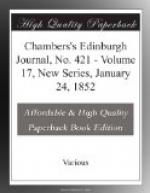more vigour in certain departments of our social policy;
but in this, as in many things, we have to make a
choice of evils. Better, we think, allow abuses
to be corrected by the comparatively sluggish action
of public opinion, than accustom a people to have
everything done for them, every action regulated by
laws and prefects of police. The account given
by Sir Francis of the manner in which the authority
of the police bears on common workmen, is only a version
of what every traveller speaks of with execration.
Although we ourselves alluded to the subject on a
former occasion, we may recapitulate a few points
from the volume before us: ’Every workman
or labouring boy is obliged, all over France, to provide
himself with a book termed un livret, indorsed
in Paris by a commissaire of police, and in other towns
by the mayor or his assistants, containing his description,
name, age, birthplace, profession, and the name of
the master by whom he is employed. In fact, no
person, under a heavy fine, can employ a workman unless
he produce a livret of the above description, bearing
an acquittal of his engagements with his last master.
Every workman, after inscribing in his livret the
day and terms of his engagement with a new master,
is obliged to leave it in the hands of his said master,
who is required, under a penalty, to restore it to
him on the fulfilment of his engagement. Any
workman, although he may produce a regular passport,
found travelling without his book, is considered as
“vagabond,” and as such may be arrested
and punished with from three to six months’
imprisonment, and after that subjected to the surveillance
of the haute-police for at least five and not
exceeding ten years. No new livret can be indorsed
until its owner produces the old one filled up.
In case of a workman losing his livret, he may, on
the presentation of his passport, obtain provisional
permission to work, but without authority to move
to any other place until he can satisfy the officer
of police that he is free from all engagements to
his last master. Every workman coming to Paris
with a passport is required, within three days of
his arrival, to appear at the prefecture of police
with his livret, in order that it may be indorsed.
In like manner, any labourer leaving Paris with a passport
must obtain the vise of the police to his livret,
which, in fact, contains an abstract history of his
industrial life. As a description of the political
department of the police of Paris would involve details,
the ramifications of which would almost be endless,
I will only briefly state, that from the masters of
every furnished hotel and lodging-house—who
are required to insert in a register, indorsed by a
commissaire de police, the name, surname, profession,
and usual domicile of every person who sleeps in their
house for a single night—and from innumerable
other sources, information is readily obtained concerning
every person, and especially every stranger, residing




